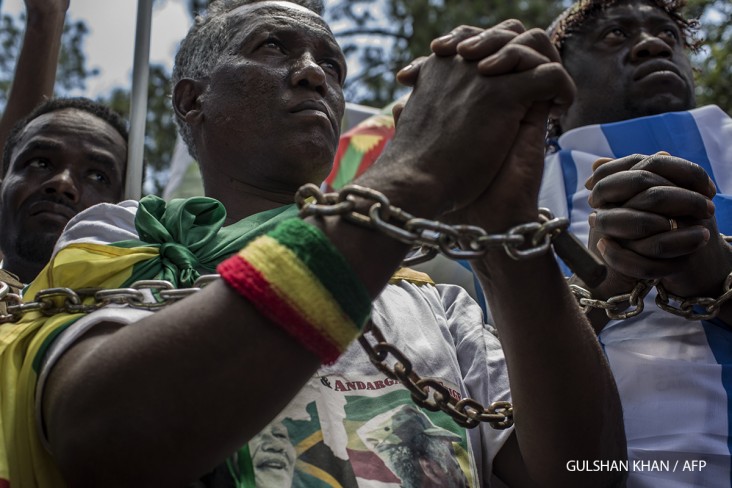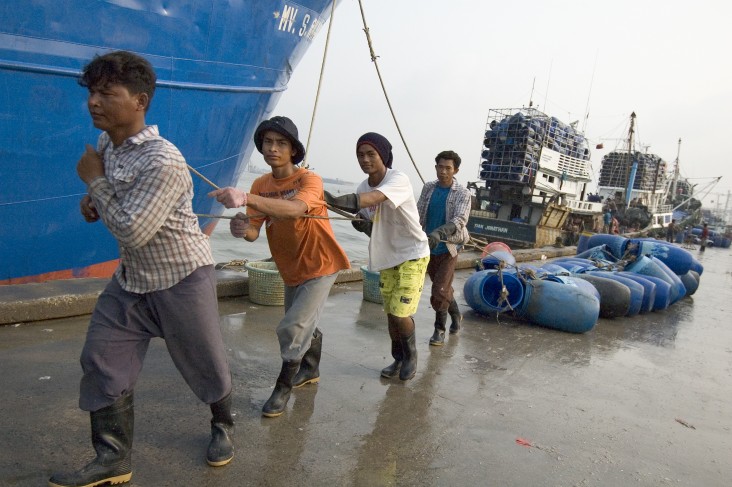- What We Do
- Agriculture and Food Security
- Democracy, Human Rights and Governance
- Democracy, Human Rights and Governance Strategy
- Supporting Free and Fair Elections
- Supporting Vibrant Civil Society & Independent Media
- Protecting Human Rights
- Promoting Accountability & Transparency
- Importance of Democracy, Human Rights, & Governance to Development
- COVID-19: Issues and Potential USAID Responses
- Countering Trafficking in Persons
- Global Labor Program
- Religious Freedom
- Youth Impact
- Economic Growth and Trade
- Education
- Environment and Global Climate Change
- Gender Equality and Women's Empowerment
- Global Health
- Humanitarian Assistance
- Transformation at USAID
- Water and Sanitation
- Working in Crises and Conflict
- U.S. Global Development Lab
Speeches Shim

Modern slavery, also known as human trafficking or trafficking in persons, affects the most vulnerable in our societies, in particular women and youth. These horrific practices undermine rule of law, corrupt global commerce, foster gender inequality, and threaten global security.
Human Trafficking involves the recruitment, transportation, transfer, harboring, or receipt of persons through the use of force, fraud, or coercion for the purposes of exploitation in forced labor or commercial sexual exploitation. Human trafficking is the second largest criminal industry worldwide, with more than 25 million people enslaved, 70 percent of whom are women and girls.
Since 2001, USAID has provided over $340 million in assistance in 88 countries and regions to fight human trafficking. We integrate our counter-trafficking efforts across multiple Bureaus and sectors, in coordination with the U.S. Government interagency and multiple external stakeholders. USAID’s Counter-Trafficking in Persons (C-TIP) approach follows the 4Ps: Prevention of trafficking, Protection of victims and survivors, Prosecution of traffickers, and Partnerships for a strengthened response.
In 2011, USAID adopted a C-TIP Code of Conduct that prohibits all employees, contractors, subcontractors, grantees, and subgrantees from engaging in behaviors that facilitate or support TIP. All Agency employees are required to take the C-TIP Code of Conduct training within their first month of employment. USAID also developed a set of standard operating procedures to prevent and respond to human trafficking abuses by USAID contractors, sub-contractors, assistance recipients, and sub-recipients.
In 2012, USAID released its first comprehensive C-TIP Policy. This Policy was revised in 2021 to update and add focus to the agency’s C-TIP efforts, via five programming objectives:
- Increased Integration of C-TIP into USAID’s Initiatives and Programs;
- Enhanced Technical Support and Coordination to Combat Modern Slavery;
- Improved Application of Learning, Evaluation, and Research in C-TIP;
- Increased Impact on Host-Government Partners; Civil Society, including Faith-Based Organizations; the Private Sector; and Beneficiaries; and
- Strategic C-TIP Investments in Targeted Countries.
In alignment with USAID’s broader humanitarian and development priorities, this Policy seeks to achieve the following outcomes:
- Improve our understanding and use of victim-centered approaches to ensure the dignity, well-being, and empowerment of beneficiaries;
- Work with host-country governments; civil society, including faith-based organizations; and the private sector to build their capacity to combat modern slavery;
- Enhance coordination within USAID and with the U.S. Government interagency;
- Draw on the best available evidence; and
- Provide clear roles and responsibilities for staff across USAID to implement effective C-TIP programming.
For more detailed information about these objectives and program examples, please see our one page description of the policy.
In 2013, USAID published a C-TIP Field Guide [PDF, 1.2MB] to educate USAID Mission personnel and partners about human trafficking, and provide technical assistance to integrate, design, implement, and monitor effective C-TIP programs.
USAID deems counter-trafficking in persons and the protection and empowerment of survivors a high priority that is essential to the Agency’s broader mission. Human trafficking is a fundamental obstacle to our humanitarian and development objectives. It impedes health and well-being, economic growth, rule of law, women’s empowerment, and lifetime prospects for youth. Trafficking in persons is a transnational crime with national implications. To deter international trafficking and bring its perpetrators to justice, the United States takes a whole-of-Government approach. This includes prioritizing the prosecution of trafficking offenses, and protecting their victims. The United States works bilaterally and multilaterally to abolish the trafficking industry by taking steps to promote cooperation among countries linked together by international trafficking routes.
USAID is one of several U.S. government departments and agencies tasked with implementing C-TIP activities. The Agency participates in the President’s Interagency Task Force to Monitor and Combat Trafficking (PITF), a Cabinet-level entity created by the Trafficking Victims Protection Act of 2000 (TVPA) to coordinate federal efforts to combat trafficking in persons. The PITF meets annually and is chaired by the Secretary of State. USAID is also a member of the Senior Policy Operating Group to Combat Trafficking in Persons (SPOG), a quarterly interagency convening established by the 2003 Reauthorization of the TVPA to implement the vision of the PITF.
For more information contact: < href="mailto:CTIP@usaid.gov">CTIP@usaid.gov
USAID C-TIP REGIONAL SUMMARIES:
- Africa – Poor economic conditions and weak governance and rights environments result in TIP in industries such as fishing, cocoa, and mining. USAID supports TIP prevention, protection and prosecution activities in the Democratic Republic of the Congo, Senegal, and Rwanda, and has integrated C-TIP into development sector projects in Mozambique, Ghana, and Mali.
- Asia – The Agency currently supports C-TIP activities in Nepal, Burma, Philippines, Bangladesh, Cambodia, Thailand, Laos, all five Central Asian Republics, and an Asia regional activity managed by the Regional Development Mission for Asia. In Bangladesh,USAID focuses on promoting safe migration. In Nepal, USAID fosters collaborative partnerships among government, private sector, and civil society stakeholders to improve foreign labor recruitment and mitigate TIP incidents, raise public awareness on countering human trafficking and safe migration, and enable survivors to access justice.
- Europe & Eurasia – Since the collapse of communism, the region became increasingly a C-TIP focus area for USAID when a number of countries experienced an increase in trafficking as they opened their borders. USAID investments have primarily related to prevention and victim support in the Balkans, Eastern Europe and select countries of the former Soviet Union including Ukraine, Belarus, Moldova, Bosnia, and Azerbaijan.
- Latin America and Caribbean – USAID’s approach to youth and citizen security programming in the northern triangle region of Central America addresses root issues related to unsafe migration to reduce vulnerability to TIP. Specifically, our Central America regional programs support institutional strengthening to identify trafficking victims and provide appropriate assistance, and identify potential traffickers. USAID currently has C-TIP activities in Guatemala, Colombia, Peru, Honduras, Haiti, and the Dominican Republic.
- Middle East – There is a significant flow of South Asian, Southeast Asian, Sub-Saharan and North African men, women and children to the Middle East for sex and labor trafficking. USAID is addressing these challenges through prevention, protection and prosecution programming. In Egypt, for example, USAID supports public awareness, vocational training, life skills, and victim protection.

Resources
USAID’s Policy for Counter-trafficking in Persons
Ending Modern Slavery: USAID’s Counter-trafficking in Persons Policy
USAID C-TIP Activities by Funding (Map)
USAID's Global Efforts to End Modern Slavery
State Department Trafficking in Persons Reports
Executive Order on Combating Human Trafficking and Online Child Exploitation in the United States
Counter-Trafficking in Persons Policy [PDF, 344K]
USAID One-pager on Integration of C-TIP in Other Sectors [PDF, 234K]
Executive Order on Strengthening Protections Against TIP in Federal Contracts
Human Trafficking and Migrant Smuggling factsheet [pdf 132,kb]
Handout on Recruitment Fees [pdf 148,kb]
List of Goods Produced by Child Labor or Forced Labor (Department of Labor)

Comment
Make a general inquiry or suggest an improvement.